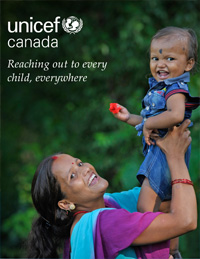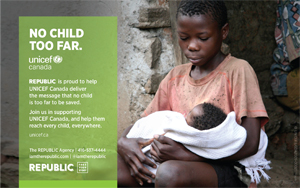Reaching out to every child, everywhere
~ By Cheryl Long
It’s Halloween night and costumed children are running door to door, happily toting bags of candy and little orange cardboard boxes filling up with pennies, nickels, dimes and even the occasional quarter. This is the image that comes to the minds of so many people when they think of UNICEF.
But today’s UNICEF, and UNICEF Canada in particular, is a far cry from the days of loose change, seasonal fundraising and holiday greeting cards. The more modern version of this long-standing organization — their roots go back to 1955 — now revolves around child advocacy, not only internationally but in Canada as well. More than 60 people work in the not-for-profit organization’s three offices in Toronto, Montreal and Calgary. Worldwide, UNICEF employs about 12,000 people and raised $5 billion last year to help children in more than 190 countries, said UNICEF Canada President & CEO David Morley.
UNICEF dates back to 1946 when it was established by the United Nations General Assembly to provide emergency food and health care to children in countries impacted by war. In 1953, the organization became a permanent part of the UN and shortened its name from the United Nations International Children’s Emergency Fund to the well-known acronym. One of the most significant events to impact child welfare occurred in 1990 when the UN’s Convention on the Rights of the Child was ratified, requiring that member nations act in the best interests of their country’s children. Currently 194 countries have signed the Convention, which binds them by international law to a specific list of civil, political, economic, social, health and cultural rights of children. The Convention named UNICEF as the entity to protect and promote those rights.
“What we do is talk with governments at all levels to make them aware of the Convention on the Rights of the Child,” Morley said. “We are advocating for a national children’s commissioner, which would be at person at the federal government level.” Just as governments today look at the environmental impact of certain legislation, the commissioner would play a similar role by investigating the government’s effect on children’s rights. That’s one of the biggest changes UNICEF Canada has undergone in recent history, by advocating for Canada’s youngest citizens along with those around the world.
Summer job turns into a lifelong career
Morley joined UNICEF Canada four years ago but has spent an entire career working in the not-for-profit sector. It began in the late 1970s when he travelled to Costa Rica with an organization called Pueblito, intending to stay for the summer and then return to Canada. Pueblito had founded a children’s village in the Central American country as an alternative to government orphanages, offering street children an opportunity to grow up in a family environment. That summer turned into a year and 20 years later, Morley had devoted two decades working at a grassroots level to improve the lives of children throughout Latin America.
Later, he moved on to serve as the Executive Director of the Canadian section of Doctors Without Borders and then President and CEO of Save the Children Canada. What drew Morley to UNICEF Canada was the chance to work at a higher governmental level and effect impactful change for children throughout the world.
“To me, if you’re working in a field and working for children’s rights and international development and emergency relief, UNICEF is the gold standard. The opportunity to work for UNICEF is pretty unique and it’s very special,” Morley said. “Of every single agency I’ve worked for and people I’ve worked with, UNICEF is the global leader because of the Convention on the Rights of the Child.
“When I was asked (to join UNICEF), I didn’t have to think twice. One of the special things about UNICEF in any country is that we get to talk to governments. We’re the biggest procurer of vaccines in the world; we reach into all the ministries of health and work together with ministries of health in every country in the world. We also work with ministries of education. We’re in essentially every country in the world.”
UNICEF’S services support children and families
UNICEF Canada offers several key services ranging from widespread immunization campaigns (last year they were responsible for vaccinating 40 percent of the world’s children) to educational efforts that include building schools, training teachers and improving curriculum. Their response to emergencies, such as this year’s earthquake in Nepal, ensures that residents in stricken areas have access to clean water, shelter and food.
Their work also takes them into the business sector where they encourage corporations to think about the rights of children on an international level, Morley said. As companies become increasingly global, it’s important to consider not only child labour but the impact that supply chain can have on developing countries. What happens to children and families when a mining company in North America opens a new extraction site halfway around the world? If a supplier in another country employs children, does that practice put their education at risk if they leave early or drop out completely to go to work each day? How do companies support families who uproot themselves to take on an employment opportunity?
“It’s awareness and education so that companies will start thinking. If their business practices are inadvertently hurting children, we’ll bring that to their attention and discuss it with them and hopefully the companies will start to think, maybe if we just modify our business practices in a certain way or we double check our suppliers in a certain way, we would be bringing more benefits to children or less harm to children,” he explained.
Fewer children under five are dying
Fortunately, their efforts are working. Around the world, fewer children under the age of five are dying from preventable causes, more children are staying in school than ever before and an increasing number of families have access to basic amenities like clean water. “It’s a revolution and we don’t remember because bad news travels faster than good,” Morley said. “We don’t talk about it enough.” Instead UNICEF Canada focuses on the work that still needs to be done, and that means continuing to reduce the number of preventable child deaths, helping to build strong community health programs, responding more quickly to emergency situations, and supporting the next generation of children in developing countries who finish elementary school and move on to secondary and even post-secondary education.
But none of the work can be done without fundraising dollars. UNICEF Canada receives no funding from the United Nations, relying on the charity and support of Canadians. “Because so much of our work is done in other countries on the other side of world, it’s challenging for Canadians to see the impact of their work,” Morley said. “We need to get better — all of us, not just UNICEF — at showing the progress that support from Canadians means. It’s fantastic what can happen (but) it’s difficult to make our voice heard.
“For us, it’s the fact that UNICEF has been given the mandate by the countries of the world to be the guardian and the protector and the promoter of children’s rights and that’s a real responsibility. We take it seriously but we need people’s help to make it happen.”
To learn more about the efforts of UNICEF Canada, visit www.unicef.org.
OUR PROUD SPONSORS:
.








